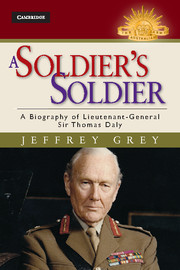Book contents
- Frontmatter
- Contents
- Illustrations
- Maps
- Tables and diagrams
- Acknowledgements
- Abbreviations
- Chapter 1 Regimental soldiering
- Chapter 2 Balikpapan, 1945
- Chapter 3 ‘He could fill any appointment with distinction’
- Chapter 4 The challenges of senior rank
- Chapter 5 Chief of the General Staff
- Chapter 6 Daly, the army and the war in Vietnam, 1966–71
- Chapter 7 The civic action crisis, 1971
- Chapter 8 Epilogue
- Notes
- Sources and Bibliography
- Index
Chapter 7 - The civic action crisis, 1971
Published online by Cambridge University Press: 05 February 2014
- Frontmatter
- Contents
- Illustrations
- Maps
- Tables and diagrams
- Acknowledgements
- Abbreviations
- Chapter 1 Regimental soldiering
- Chapter 2 Balikpapan, 1945
- Chapter 3 ‘He could fill any appointment with distinction’
- Chapter 4 The challenges of senior rank
- Chapter 5 Chief of the General Staff
- Chapter 6 Daly, the army and the war in Vietnam, 1966–71
- Chapter 7 The civic action crisis, 1971
- Chapter 8 Epilogue
- Notes
- Sources and Bibliography
- Index
Summary
Like many soldiers before and since, Daly believed firmly that a national government should not commit the armed forces to war unless they were willing to win it. ‘You should never get involved in a war that you don't intend to win’, he stated, and a war could not be won ‘on the defensive’. Like many critics of Australian involvement, he came to the view that Australia had no direct strategic interest in Vietnam and that Australia's contribution was ‘very minor’ in comparison with the vast forces fielded by the Americans and the South Vietnamese themselves. The progress in Phuoc Tuy itself was clear enough, with the enemy presence (or, at least, enemy activity) having fallen away ‘to fairly negligible proportions’ towards the end of the Australians’ time there, at least according to the intelligence briefs provided to the Chief of the General Staff. (In point of fact this was not entirely true, and the movement of elements of the North Vietnamese 33rd Regiment into the province in the course of 1971 led to some serious fighting. Daly's more conservative reading of the situation was, in fact, more accurate.) Australian policy in Vietnam was reactive, in the sense that its primary drivers had always been the US alliance and decision-making in Washington (rather than in Saigon) and, with Richard Nixon becoming President on a platform of ‘peace with honor’ (and disengagement from the war), Australian policy faced some sharp, although entirely predictable, challenges.
- Type
- Chapter
- Information
- A Soldier's SoldierA Biography of Lieutenant General Sir Thomas Daly, pp. 177 - 196Publisher: Cambridge University PressPrint publication year: 2012



